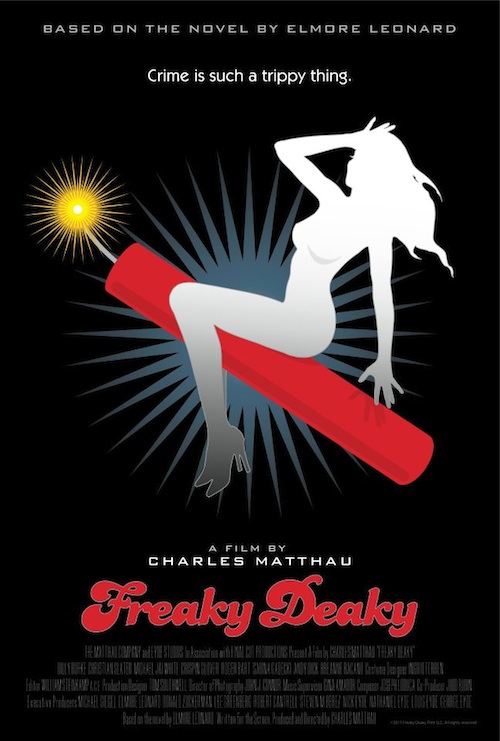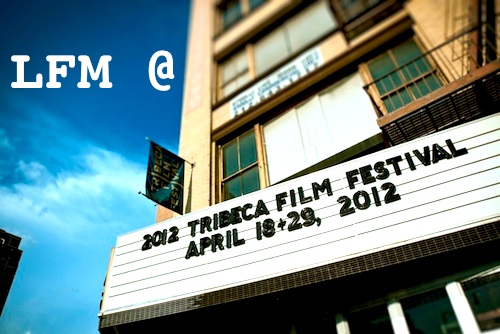 By Joe Bendel. Starting out as a western writer but eventually hitting his stride with crime novels, Elmore Leonard has a reputation for his sharp dialogue and lethal characters. Notable adaptations of his work include Out of Sight, Jackie Brown, Get Shorty, and 3:10 to Yuma. Indeed, the bard of badaassery’s support for a new big screen treatment of his work factored prominently in the Tribeca Talks panel discussion following the special screening of Charles Matthau’s Freaky Deaky (trailer here) during the 2012 Tribeca Film Festival.
By Joe Bendel. Starting out as a western writer but eventually hitting his stride with crime novels, Elmore Leonard has a reputation for his sharp dialogue and lethal characters. Notable adaptations of his work include Out of Sight, Jackie Brown, Get Shorty, and 3:10 to Yuma. Indeed, the bard of badaassery’s support for a new big screen treatment of his work factored prominently in the Tribeca Talks panel discussion following the special screening of Charles Matthau’s Freaky Deaky (trailer here) during the 2012 Tribeca Film Festival.
Originally set in the 1980’s, Matthau shifted Freaky to the groovy 1970’s at Leonard’s suggestion. About to be transferred out of the bomb squad, Det. Chris Mankowski does not exactly kill himself trying to save a booby-trapped gangster. Still, it looks rather bad. Relegated to vice as a result, Mankowski takes the call when failed starlet Greta Wyatt files a rape report against wealthy creep Woody Ricks. Talk about a discordant way to kick off a supposedly madcap romp.
Initially, Mankowski downplays the legal recourse available to Wyatt, but he decides to rattle the nutter’s cage anyway. He is not the only one with his sights on the antisocial weirdo. Demolitions expert Skip Gibbs and his friend-with-benefits Robin Abbot blame Ricks for their own scrape with the law, for reasons that are hazily glossed over. To get to him, they will use his brother Mark as the tool he so obviously is. Meanwhile, Mankowski develops a personal interest in Wyatt and a sort of-kind of professional rivalry with Ricks’ bodyguard-fixer, Donnell Lewis.

Once you get past the unseemliness of the film’s catalyst, it is a breezy enough distraction. However, despite the vintage cars and occasional file footage of Vietnam or Watergate, the film never really gets inside the 70’s mindset. This was a bizarre period of time, when millions of Americans were joining Est cults and taking Erica Jong seriously. By comparison, though not exactly a classic, the film version of Serial (released in 1980) is far more successful capturing the vocabulary and attitudes of the era. (It also offers the opportunity to see Martin Mull playing off Sir Christopher Lee). Still, there is one appealing era-appropriate in-joke. In a nod to the director’s father, every movie theater seen in Freaky is showing a Walter Matthau film, which might well have been possible in 1974.
Frankly, what distinguishes Freaky is the unusually eccentric cast it assembles, including Crispin Glover, Andy Dick, and Christian Slater. It begs two questions: how did they manage to insure this production, and where was Tom Sizemore? Perhaps he was already locked-in somewhere else. While it is nice to see blaxploitation veteran and former Bond girl Gloria Hendry, even in a small bone-thrown-to-genre-fans role, and Michael Jai “Black Dynamite” White doing his thing as Lewis, it is relative newcomer Breanne Racano who shines the brightest as femme fatale Abbot, clearly understanding villainesses should enjoy being devious.
According to the post-screening discussion, there may in fact be a Black Dynamite sequel in the works. Freaky Deaky actually compares reasonably favorably to White’s prospective franchise, but hardly so in the case of the senior Matthau’s gritty classics, like The Taking of Pelham One Two Three. Flawed but somewhat diverting, largely thanks to Racano’s head-turning work, Freaky Deaky has already had some rights announcements following its Tribeca Talks screening at the 2012 Tribeca Film Festival.
LFM GRADE: C+
Posted on May 1st, 2012 at 7:46pm.


